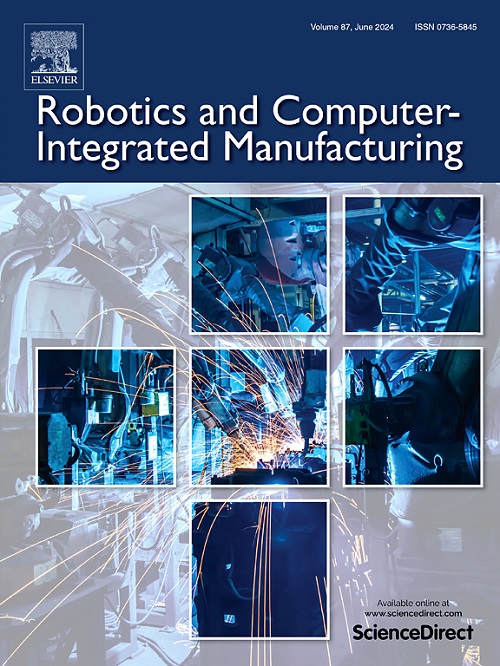Real-time defect detection and classification in robotic assembly lines: A machine learning framework
IF 11.4
1区 计算机科学
Q1 COMPUTER SCIENCE, INTERDISCIPLINARY APPLICATIONS
引用次数: 0
Abstract
Manufacturing systems have witnessed a significant transformation with the introduction of Industry 4.0, introducing new capabilities with the emergence of new technologies. One such instance is the proliferation of sensors enabling the generation and acquisition of vast amounts of data, leading to advancements in Artificial Intelligence (AI) for manufacturing. One field profiting from this is that of Time Series Analytics (TSC) which includes forecasting and classification. TSC can be crucial for fault detection and diagnosis in manufacturing systems. However, there are still challenges in utilizing manufacturing datasets to train and deploy classification algorithms for real time classification. As such this paper aims to tackle these challenges by presenting a closed-loop framework for the testing and deployment process of TSC algorithms. This paper also details the feature selection and extraction process outlining specific criteria to be considered throughout. This is done by presenting a new manufacturing dataset acquired from a robotic assembly line and detailing the full process undergone in this study to train and deploy TSC algorithms on that manufacturing system.
机器人装配线的实时缺陷检测和分类:一个机器学习框架
随着工业4.0的引入,制造系统发生了重大转变,随着新技术的出现引入了新功能。其中一个例子是传感器的激增,能够生成和获取大量数据,从而导致制造业人工智能(AI)的进步。从中受益的一个领域是时间序列分析(TSC),它包括预测和分类。TSC对于制造系统的故障检测和诊断至关重要。然而,利用制造数据集训练和部署分类算法进行实时分类仍然存在挑战。因此,本文旨在通过为TSC算法的测试和部署过程提供闭环框架来解决这些挑战。本文还详细介绍了特征选择和提取过程,概述了整个过程中要考虑的具体标准。这是通过展示从机器人装配线获得的新制造数据集来完成的,并详细介绍了本研究中为在该制造系统上训练和部署TSC算法所经历的整个过程。
本文章由计算机程序翻译,如有差异,请以英文原文为准。
求助全文
约1分钟内获得全文
求助全文
来源期刊
CiteScore
24.10
自引率
13.50%
发文量
160
审稿时长
50 days
期刊介绍:
The journal, Robotics and Computer-Integrated Manufacturing, focuses on sharing research applications that contribute to the development of new or enhanced robotics, manufacturing technologies, and innovative manufacturing strategies that are relevant to industry. Papers that combine theory and experimental validation are preferred, while review papers on current robotics and manufacturing issues are also considered. However, papers on traditional machining processes, modeling and simulation, supply chain management, and resource optimization are generally not within the scope of the journal, as there are more appropriate journals for these topics. Similarly, papers that are overly theoretical or mathematical will be directed to other suitable journals. The journal welcomes original papers in areas such as industrial robotics, human-robot collaboration in manufacturing, cloud-based manufacturing, cyber-physical production systems, big data analytics in manufacturing, smart mechatronics, machine learning, adaptive and sustainable manufacturing, and other fields involving unique manufacturing technologies.

 求助内容:
求助内容: 应助结果提醒方式:
应助结果提醒方式:


